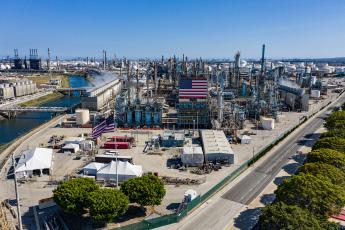*The op-ed below originally appeared in the Houston Chronicle on Monday, February 19, 2018 President Trump clinched a historic victory with tax reform. Now he needs to avoid making a historic mistake by quitting NAFTA, one of the most important pro-growth policies of the last three decades. Tax reform is already stimulating significant new investments as U.S. companies react to a more favorable domestic business environment. The new corporate tax rate, which was slashed by more than a third to 21 percent, is also expected to give our economy a boost as foreign firms seeking lower costs move to the United States - some of them would likely cross the borders from Canada and Mexico. It would be foolish at this time to forfeit the full benefits of tax reform by closing our borders to two of our top trading partners.
The risks of withdrawing from NAFTA would be severe in the fuel and petrochemicals sector, given North America's high degree of energy interdependence. The United States gets half of the eight million barrels of crude oil it imports each day from Canada and Mexico. Meanwhile, our two North American partners buy a third of U.S. fuel exports and about half of our petrochemicals exports. Texas, as Houstonians well know, is at the heart of the U.S. energy industry and a driving force in this cross-border energy trade. More than a third of U.S. oil is product from wells in Texas and the state's 29 operating refineries process a third of the barrels turned into fuels each day in this country. Restricting the free movement of fuels and petrochemicals, which are used to make plastics and other products that make modern life possible, would raise prices, hurt consumers and be felt close to home. A strong energy industry means a strong Texas economy, with nearly 50,000 jobs supported by the fuel and petrochemical sectors, according to IMPLAN. NAFTA has been an important generator of that employment and growth. It has encouraged a surge in investments in North America since its inception, growing more than five-fold from 1993 to surpass $700 billion now, according to the Congressional Research Service. Our U.S. companies see the potential for more opportunity in the transportation fuels sector, which will also grow economic activity. Since Mexico's move to further liberalize its energy sector began in 2013, companies like Andeavor, ExxonMobil, BP and Valero have all announced plans to export fuels made in their U.S. refineries by American workers. Not to be ignored, the opportunities in petrochemicals are also significant. The U.S. has become the preferred global base for petrochemical manufacturing thanks to cheap electricity and inexpensive feedstock from the U.S. shale boom. Investments in the industry totaled $25 billion in 2017, and expansions will continue with more than $150 billion worth of projects in the queue. As global demand for ethylene increases, our domestic companies are investing tens of billions of dollars in new plant capacity and export facilities. We shouldn't stall their progress by shutting borders.
ion address that "we are now an exporter of energy to the world." This historic transformation was no small feat. In fact, it was enabled by NAFTA and efficient U.S. refiners. If NAFTA is kept intact, North American fuel and petrochemicals trade will be able to further expand and add to U.S. economic growth by contributing to new investments and expansions that strengthen manufacturing and support U.S. jobs. The free flow of trilateral trade encourages the development of new U.S. energy sources by ensuring producers will have ready access to adjacent markets. Have no doubts, any new trade barriers would compromise North America's economy and energy security. As U.S. trade negotiators chart a path forward following talks in Montreal, they should uphold the core tenets of the agreement. Doing so would help to ensure the full benefits of tax reform are realized, allowing U.S. manufacturers to succeed.


